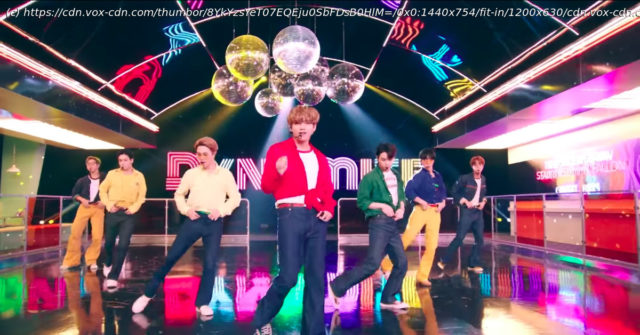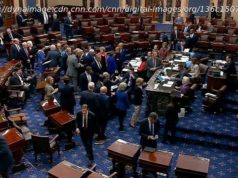BTS deserved a better chart-topping hit than « Dynamite. »
Even if you don’t pay much attention to pop music, you most likely have heard of the K-pop boy band BTS. And you also may be aware of the group’s late-summer bop “Dynamite,” which made history when it debuted on the Billboard Hot 100 chart’s No.1 spot — then made history again when it scored the band a Grammy nomination for Best Pop Duo or Group Performance. First, the single held steady at the top for two weeks — a true feat in a year when most of us have probably been battling giant attention deficits — then fell to No.2 in week three and four, then bounced back up to No.1, kicking off October with, as the song itself declares, “a little funk and soul.” “Dynamite” dominated the charts for six weeks straight — a feat that seemed unheard of just six months ago. The massively popular K-pop group became only the third band in history to release a single that debuted at the top spot, putting it in a league with Aerosmith (for 1998’s “I Don’t Wanna Miss a Thing”) and the Jonas Brothers (for 2019’s “Sucker”). It’s probably significant that both of those bands, in different ways, are so quintessentially American — because so, too, is “Dynamite.” Written by veteran UK producer David Stewart and former UK pop star Jessica Agombar, “Dynamite”’s production was reverse-engineered from the way the band and its studio BigHit typically operate. BTS members are all musicians who’ve individually produced and written tracks on their own albums. “Dynamite,” however, was reportedly approved by the head of Columbia Records before the band itself ever signed off on the lyrics. And those lyrics… oy vey. We need to talk about the lyrics to “Dynamite.” I need the world to know that BTS’s artistry cannot and must not be defined by the lyrics to “Dynamite” — because the lyrics to “Dynamite” aren’t true BTS lyrics, not really. They are, instead, a consummate subversion of what Americans, or at least American producers, think “American” music needs to be in order to get radio play and air time. They’re awful. I hate them — but they’re also brilliant. And I need everyone reading this to understand why. K-pop has long struggled to win mainstream American acceptance. BTS got closer than anyone — but it still wasn’t enough. But first, some background: I’ve been listening to K-pop since 2005, and a fan of BTS since 2016 or so — “Not Today” was the first BTS song that really grabbed my attention, and I’ve been on that train ever since. I think the Korean pop music industry is one of the most sophisticated entertainment industries in the world, and that Korean idol music is among the smartest, most stylish, and most compelling genres around. Like many K-pop fans, I’ve been deeply frustrated over the years by the inability of Korean idol groups to break into the landscape of American pop music, beyond a few viral hits like “Gee” and “Gangnam Style” that were more like novelties than true critical sensations. The increasingly global success of many newer K-pop bands, along with the advent of major fan conventions in the U.S. like the bi-coastal KCon, have drastically shifted American attitudes towards Korean music over the years. I couldn’t have imagined when I attended the first East coast KCon back in 2015, for example, that Blackpink would be headlining Coachella just four years later. But despite all of these inroads, K-pop bands have long been effectively shut out from mainstream American radio play. I wrote about this quandary in more depth back in March, when BTS managed to score its highest place on the Billboard pop chart yet, with their then-latest single “On.” As I noted then, despite BTS garnering a staggering number of global achievements — including performing in Times Square on New Year’s Eve, on Saturday Night Live, and at the 2019 and 2020 Grammys — American radio DJs have expressed some very specific reasons for not giving the band more air time. Chief among them: The band’s refusal to sing in English. This explanation — blatant, petty American xenophobia — is the main reason that BTS’s previous big singles, from its harder stuff like “Mic Drop” to summery, chill bops like “DNA” and “Boy With Luv,” never managed to really get off the ground in the U.S., despite having essentially conquered the internet and streaming sales. Keep in mind that as I write this, BTS is just shy of spending 200 weeks straight at #1 on the Social 50 chart, Billboard’s metric for the musical artists with the highest social media engagement. That’s almost four years at the top of the chart. That’s a lot of weeks to be, as one fan put it, “the biggest group in the world with the worst radio play.”BTS hit a xenophobic wall. So it changed tactics. Because not enough radio stations had begun to budge on their xenophobic discrimination, “On” was only able to reach #4 back in March.






